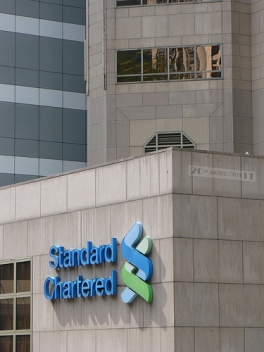Standard Chartered Bank and the Ethics of Corporate Lawyers

It has taken a while but, as Moorhead and Webb have noted in recent months, questions are finally being asked about the role of lawyers who act for banks.
The case against Standard Chartered (SCB), discussed recently by Webb, may be an easy one from an ethical perspective insofar as the regulators have alleged that the lawyers knew that the client was deliberately breaking the law and assisted in this (the charges refer to regulatory evasion and to the deliberate concealment of Iranian involvement). It is likely that most lawyers would consider this wrong and it may explain why (according to the charges) external lawyers were not prepared to endorse the activity.
But a closer reading of the charges suggest that this might be a harder case, in which SCB engaged in activity which it thought was technically compliant though it may have known that it was deceiving the regulator and violating the spirit of the regulations. Thus the primary concern of the SCB legal and compliance officers was that if the regulator was aware of Iranian connections, transactions would be held up while the regulator made further inquiries. It does not appear to have been thought that the transactions were actually unlawful. SCB also specifically designed schemes which it thought enabled it to successfully avoid regulation (such as the development of an off-shore due diligence facility). This is a problem of ‘creative compliance’ and of a culture that views law and regulation as an obstacle to be circumvented rather than as a common good that should be respected.
The SCB affair raises questions about the values of corporate lawyers. Assuming that the lawyers acted lawfully, what was nevertheless unacceptable about their behaviour (if the facts alleged are correct) was not that they failed to act morally or counsel their clients to do so-in my view this is not inherently part of the lawyer’s role. Rather as Bradley-Wendel has argued, lawyers should be faithful to the law which requires that they should counsel their clients to respect the spirit of the law, and not just the letter. But the behaviour outlined in the charges against SCB shows no such respect. This is an issue for both internal and external lawyers. Looking elsewhere, Barclays, whose longstanding aggressive attitude towards compliance-particularly in the field of tax avoidance- produced a culture which led to the manipulation of LIBOR, could not have structured its tax avoidance activities without the assistance of its external law firms.
While we cannot rely on external law firms to respect the spirit of the law, we should not discount the role of internal lawyers. For sure the independence of such lawyers is compromised by their embedded position within the firm and by the pressure upon them to adopt business values as Nelson and Nielsen found in their survey of in-house lawyers. However Nelson and Nielsen also found that a substantial proportion of their in-house respondents saw themselves, at times, as ‘cops’ (17 per cent) or ‘counsel’ (50 per cent). Cops saw their role as ensuring that the company and its managers complied with the law while counsel advised the client on the legal, ethical and commercial implications of a course of action. Moreover the Commerce and Industry Group, (‘C & I Group’) a body which represents in-house lawyers, found in a survey that 58 per cent of in-house lawyers felt that in-house lawyers were ‘the conscience of the corporation’. It is also notable that post-Enron in-house lawyers debated the ethical issues that arose and outside law firms did not. Two other considerations to throw into the mix: it seems that in-house lawyers are more prepared than external lawyers to counsel managers on their fiduciary obligations and personal responsibilities to the company (L. Johnson and D. Garvis, ‘Are Corporate Officers Advised about Fiduciary Duties?’ (2009) 64 Business Lawyer 1105,1119) whilst Gunz and Gunz found that external lawyers reported that companies with in-house counsel were less likely to pressurise the external lawyers to behave unethically. They speculate that in-house counsel may act as a buffer between external lawyers and managers’ unethical demands (‘Client Capture and the Professional Service Firm’ (2008) 45 American Business Law Journal 685, 720). If so in-house counsel appear to resolve the demands in a way that is ethically acceptable for external lawyers.
In-house lawyers also do not have the luxury of not knowing what is going on in the company. In 2003 SCB’s external lawyers advised that the bank’s actions “did not comport with the law or the spirit of OFAC rules”. But then what? Unlike the internal lawyers the external lawyers would not necessarily have known that this practice continued. Internal lawyers however cannot easily engage in denial. In some cases internal lawyers may be better informed and as a result feel more responsible for the firm’s actions than external lawyers. This in turn could act as a constraint on the advice they give to, and what they are prepared to do for, the client.
The question of how we want banks and other large companies to behave will be addressed by focussing on the companies themselves and on the full structure of corporate governance and regulatory mechanisms. It is notable for example, that the accountancy firm Deloitte & Touche LLP is also being accused by the regulators of assisting in a cover up at SCB. Insofar as we want lawyers to behave better it may be in part because it could promote better behaviour by clients, but it is also something that we can expect of lawyers independently of such considerations, because of the privileges they enjoy, because of their influence on the law and because of the (possibly misplaced) trust that society and the profession’s regulators, repose in the ‘elite’ sector of the profession.
* This opinion first appeared on the blog "Lawyers and the Legal Profession" on 11 August 2012 and is reproduced with permission.


Add new comment